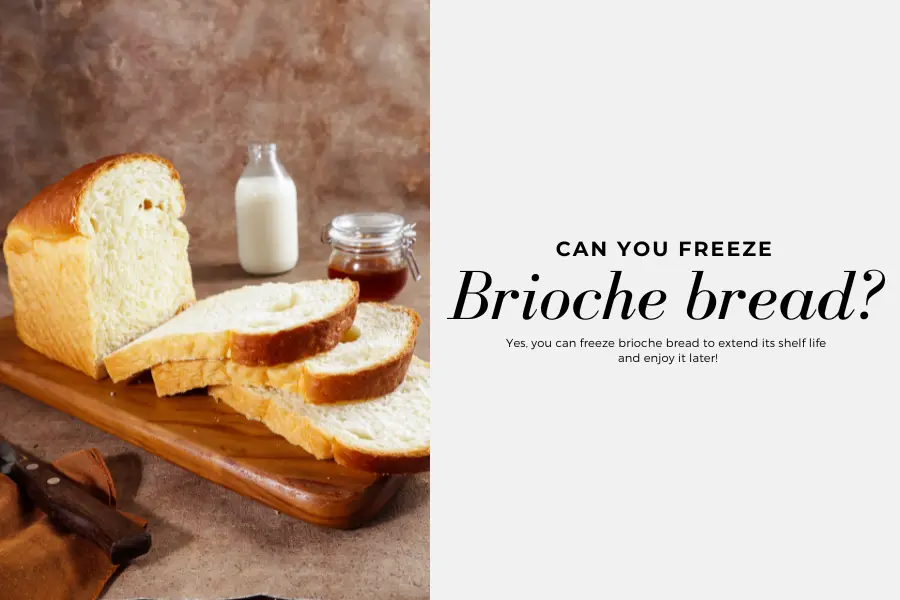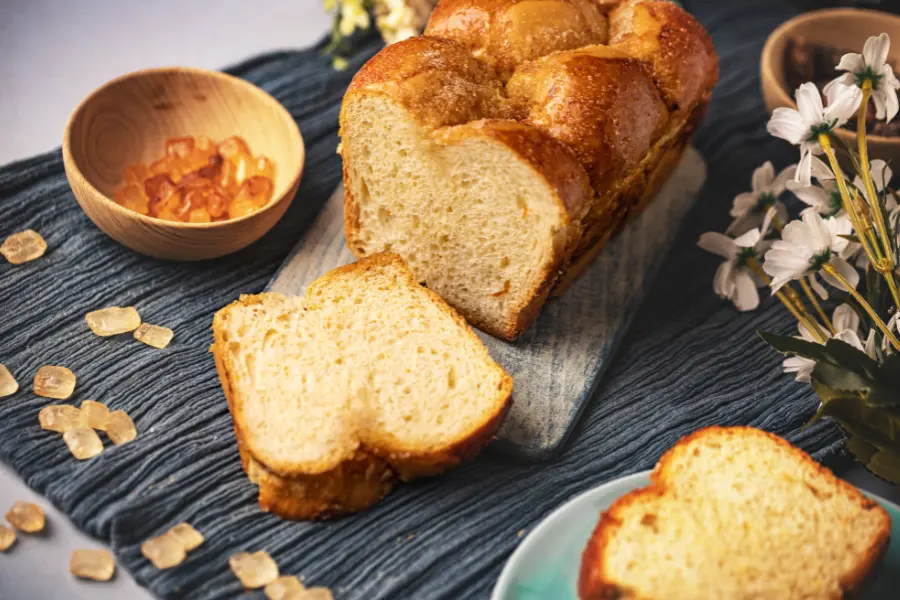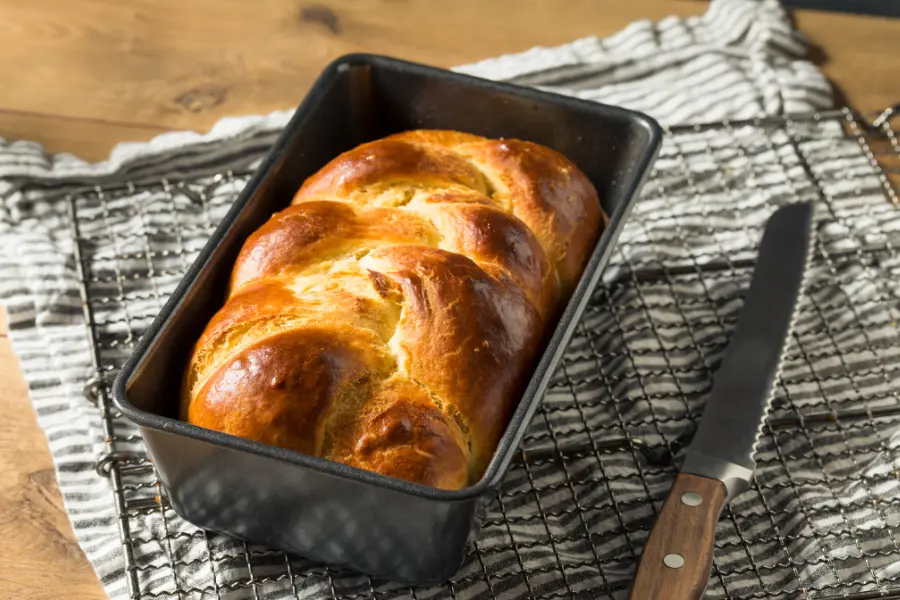
Fresh brioche bread is a great choice for the family on busy mornings. Brioche is a type of cake that is loved and widely used worldwide and can be combined to create many interesting dishes. However, you only sometimes have time to make cakes or go a long way to get to your favorite bakery. Right now, the best solution is to have pre-prepared brioche and just reheat and use it.
Therefore, the question: “Can you freeze brioche bread?” will be of interest to many people. Because cake is a meticulously prepared food, if it is frozen, will it still be fresh and safe for health? In this article, we will learn about how to freeze brioche bread and brioche dough, and how to reheat it properly without affecting the flavor and texture of brioche bread.
What is brioche bread?
Brioche is a soft, sweet, rich bread, suitable for pairing with sweet and savory dishes. With a golden brown outer texture, it usually has a thin, lightly crispy crust due to being brushed with eggs or butter before baking. The inside of the cake is closer to a cake than regular bread. Brioche is often used to make sandwiches, toast, or simply served with jam and butter.
Brioche has become a favorite bread worldwide thanks to its delicious flavor and distinctive texture. In European countries like the United States, Brioche is used as burger crust and French toast. In Sicily, brioche is often cut in half and sandwiched with gelato, creating a unique and delicious dessert.
How do you serve brioche bread?

Brioche can be served in a variety of ways. You can enjoy breakfast with simple slices of brioche bread with jam, butter, or honey. French toast on brioche bread is also popular, served with avocado, smoked salmon, or poached eggs. If you don’t want to eat salty dishes, you can eat them with fresh berries or whipped cream. The kids love this dish!
Another fun combination using brioche as a sandwich, includes ham and cheese, chicken salad or BLT (bacon, lettuce, and tomato), or delicious ice cream cake.
Brioche is also ideal for making puddings. Cut the bread into cubes and soak in a mixture of eggs, cream, sugar, and vanilla, then bake until golden brown.
So, you have many ways to use brioche bread, from baking, and making sandwiches, to desserts. All brioche dishes cater to gourmets!
Can you freeze brioche bread?
Yes, you can freeze brioche bread to extend its shelf life and enjoy it later!
Will freezing my brioche bread affect its buttery flavor?

Texture can be affected because freezing brioche dough or bread can slightly affect its texture, but with proper handling, the buttery flavor should remain largely intact. Here are some tips to minimize any potential impact on flavor and texture:
Tips to Preserve Flavor and Texture When Freezing Brioche
- Fresh Ingredients should be a priority: All ingredients need to be ensured are fresh before making the dough, especially the butter. This is because fresh ingredients help maintain the quality of the dough during freezing.
- Proper Wrapping: Wrap the dough or bread tightly in plastic wrap, followed by a layer of aluminum foil, and then place it in an airtight container or resealable freezer bag. This prevents freezer burn and is affected by other odors from the freezer.
- Flash Freeze: For dough, flash freeze individual portions on a baking sheet before wrapping and storing them. This helps maintain the dough’s shape and texture.
- Thaw Gradually: Thaw the frozen brioche dough or bread slowly in the refrigerator to prevent condensation, which can affect the texture. For best results, transfer it from the freezer to the refrigerator the night before you plan to use it.
- Reheat Properly: If reheating brioche bread, do so in an oven preheated to 300°F (170°C) for about 10-15 minutes. This helps restore its original texture and enhances the buttery flavor.
- Avoid Refreezing: Once thawed, do not refreeze the dough or bread, as repeated freezing and thawing can degrade both flavor and texture.
Freezing Your Brioche Bread: A Step-by-Step Guide

By following our simple steps, freezing brioche bread is a great way to keep it fresh and delicious for longer. Here’s a simple guide to help you get it right:
- First step: You should ensure the brioche is completely cool before freezing to prevent condensation and ice crystals from forming. It’s a critical step to avoid any moisture from turning into ice crystals, which could turn your brioche spongy instead of maintaining that desired tender crumb.
- Second step: You can slice the cake (optional). Sometimes you just want to eat a slice of cake and don’t want to defrost the whole loaf. So, you might consider cutting the cake into bite-sized slices before freezing.
- Third step: You wrap the cake carefully. If you don’t wrap the cake well, your cake is at risk of freezer burn. The brioche will lose its water, moisture, and unique texture. You should wrap the brioche tightly in plastic wrap, aluminum foil, a freezer bag, or an airtight container. You can choose any suitable type to remove as much air as possible.
- Last step: You take a label to track the expiration date: Label the package with a date so you can keep track of how long it has been in the freezer. Brioche can be frozen for up to 2-3 months for best quality.
Freezing Your Brioche Dough: Protecting for a long haul
The same way you can freeze batter, you can also freeze the dough after it’s prepared. This way, when you need it, you have ready-to-use dough with your recipe without the need to go through the preparation process multiple times.
You start with preparing the dough according to your cake recipe until the cake dough is prepared and the first rise is completed. You shape the dough into your desired forms, such as rolls, loaves, or dumplings. Then, you place the shaped dough pieces on a baking tray lined with parchment paper or lightly dusted with flour. Dough should be frozen on the sheet for 1-2 hours or until it is firm. As a final step, you take the dough out of the baking tray and wrap each piece tightly in plastic wrap or aluminum foil. Last but not least, you place wrapped pieces in a resealable freezer bag or airtight container.
How to reheat brioche bread?
When it’s time to bake, you must defrost the dough carefully. You can transfer it from the freezer to the refrigerator and leave it there overnight. Then leaving it in the refrigerator overnight helps prevent the dough from being shocked by temperature changes.
You take the dough out and leave it at room temperature to give the yeast time to become active again after overnight in the refrigerator. This is very important because it will determine the nice puffiness of your Brioche cake. Finally, once the dough has risen, you can bake the cake as usual. Remember, whether it’s a full loaf or individual buns, the process is essentially the same. You can also apply this technique to regular breads like banana streusel bread, sandwich bread, or waffles.
When it comes to Brioche cakes, you don’t have much time in the morning and want to have the cake ready to take to work with a hot cup of coffee. The best way is to warm the cake in the oven at 300°F. To prepare the cake for heating, you will need a baking sheet, line it with parchment paper, and place your brioche on it. Pay attention to your cake, because this is just a heating step, not baking like the first time.
Final Thought
Thus, the obvious answer to the question “Can you freeze brioche bread?” is YES. You need to follow a strict freezing and thawing process to protect your brioche bread and brioche dough. Freezing bread brings convenience, saving time and effort for your family. You can maintain the habit of eating brioche bread every morning to increase the nutritional value of your breakfast.



